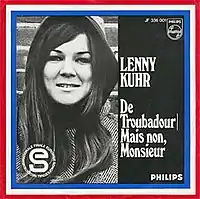De troubadour
"De troubadour" ("The troubadour"), sung in Dutch by Lenny Kuhr represented the Netherlands in the Eurovision Song Contest 1969. It was one of the four winners that year, the others being "Vivo cantando", "Boom Bang-a-Bang" and "Un jour, un enfant" from respectively Spain, the United Kingdom and France.
 | |
| Eurovision Song Contest 1969 entry | |
| Country | |
| Artist(s) | |
| Language | |
| Composer(s) | David Hartsema |
| Lyricist(s) | Lenny Kuhr |
| Conductor | |
| Finals performance | |
| Final result | 1st |
| Final points | 18 |
| Entry chronology | |
| ◄ "Morgen" (1968) | |
| "Waterman" (1970) ► | |
It is a ballad inspired both musically and lyrically by folk-song traditions. Kuhr sings about a troubadour of the Middle Ages, describing the impact the music has on his audiences. Kuhr also recorded the song in English (as "The Troubadour"), French ("Le troubadour"), German ("Der Troubadour"), Italian ("Un cantastorie") and Spanish ("El trovador"). The 1969 Contest was controversially held in Madrid, Spain during Francisco Franco's dictatorship; 5 years after the Contest, Kuhr also recorded the song with revised Dutch lyrics, then retitled "De generaal" ("The general"), which was a homage to the Dutch national soccer coach Rinus Michels, who was nicknamed so by the players of the Dutch team.
The song was performed eighth on the night, following the United Kingdom's Lulu with "Boom Bang-a-Bang" and preceding Sweden's Tommy Körberg with "Judy, min vän". By the time voting closed, it had received 18 points, placing it equal first in a field of 16. Since the Dutch entry in 1968 was joint last, the Netherlands thus achieved the rare feat of going from (equal) last to (equal) first in the space of one year.